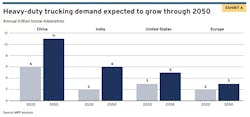Industry leaders offer roadmap to zero emissions
Researchers and industry leaders have developed a transition strategy for how the heavy-duty trucking sector can reach zero emissions by 2050. The report details a roadmap to widespread zero-emission truck adoption and the development of supporting infrastructure while considering various economic possibilities for the upcoming decades.
“Making Zero Emissions Trucking Possible: An Industry-Backed, 1.5°C-Aligned Transition Strategy,” developed by the Mission Possible Partnership (MPP), details economic milestones for 2050 the near term. The MPP is an alliance of climate leaders led by the Energy Transitions Commission, RMI, the We Mean Business Coalition, and the World Economic Forum. The report is endorsed by organizations involved in MPP’s Road Freight Zero coalition, including ABB, DP DHL Group, and IKEA Supply.
The comprehensive report examines a range of decarbonization options that take into account technology readiness, availability, applicability, cost, resource efficiency. Multiple projections are detailed based on varying possibilities, including the speed of technological development and enactment of regulation and policy.
See also: Rival OEMs finalize deal on European EV charging network
“The potential for heavy-duty vehicles to impact how quickly we reach a zero-emission transport future cannot be underestimated. While representing less than 4% of the vehicles on our roads, heavy vehicles are responsible for more than 40% of global road transport emissions, said Frank Muehlon, CEO for report signatory ABB E-mobility. “As a sector, we have a unique opportunity to collaborate to drive positive change. The time for that collaborative action is now.”
Key points in the transition strategy
Zero-emission trucks (ZETs) will be cheaper to run than diesel equivalents. Already, operational electric fleets have achieved substantial savings. Higher vehicle costs will be more than recouped through lower operating costs. Most ZETs will achieve superior Total Costs of Ownership (TCO) between 2022 and 2033.
Policy change is necessary to achieve zero emissions from trucking by 2050. According to MPP's predictions, market forces will cause 80% of trucks to produce zero emissions by 2050, but total net zero emissions will not be met without policy intervention. Strategies to coordinate the supply of ZE vehicles and refueling infrastructure will prevent 6-13 gigatons of CO2e emissions
Financing the transition in developing economies will require more capital, creating an opportunity for global climate finance to enable a worldwide transition to net zero. The report details business models and financing instruments to leverage ZETs’ lower operating costs in order to mobilize capital to pay for their purchase.
- Operators need more public charging and hydrogen stations, a more mature ZET production value chain, and enough grid power for both charging and hydrogen production.
See also: Newest NACFE report finds all medium-duty box trucks electrifiable
The report joins a series of sector transition strategies that MPP is developing. Of the seven harder-to-abate sectors MPP is addressing, three are from the transport sector: aviation, shipping, and trucking. Together representing approximately 10% of global greenhouse gas emissions, they share multiple common characteristics, with high expected demand growth rates, expensive long-life assets, and significant demands on new energy systems.
An interactive application to explore sector transition scenarios and an open-source software model providing the analytics underlying the sector transition scenarios will be available later this year.
MPP will continue securing additional signatories through November 2022. Companies who would like to join can reach out to [email protected].
Signatories as of July 14th include: ABB, A.P. Moller-Maersk, Credit Suisse, DP DHL Group, Inter-IKEA Group, Kuehne & Nagel, Port of Antwerp-Bruges, Volta Trucks, CALSTART/Drive to Zero, Professor Alan McKinnon – Kuehne Logistics University, and Smart Freight Centre.
About the Author
FleetOwner Staff
Our Editorial Team
Kevin Jones, Editorial Director, Commercial Vehicle Group
Josh Fisher, Editor-in-Chief
Jade Brasher, Senior Editor
Jeremy Wolfe, Editor
Jenna Hume, Digital Editor
Eric Van Egeren, Art Director

